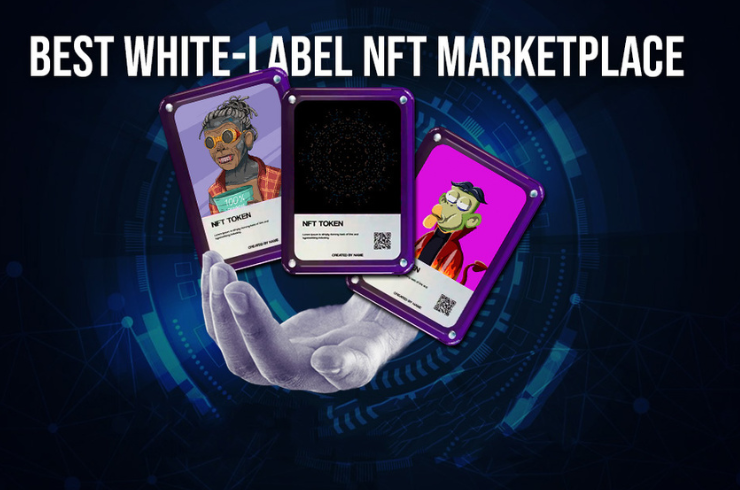2022 started off with a flyer for NFT marketplaces, with platforms like OpenSea, LooksRare, and Foundation leading the pack. While there may be a slight decline now, there is still an ample number of businesses seeking to build their marketplace platforms. There are several ways to build: developing the platform from scratch, leveraging the white-label NFT marketplace, and much more.
White-labeling has been around the tech space for quite some time now. Amidst current technological advancements, anyone can develop cost-effective marketplace platforms. But then, how to make the best white-label NFT marketplace? This blog deals with the same!
What Constitutes the Best White-label NFT Marketplace?
A White-label NFT marketplace is an online platform that helps entrepreneurs manage a business model. As an entrepreneur looking to start your business, one of the biggest decisions you’ll make is embedding the ‘best’ features & functionalities in your platform.
Here are some extraordinary things that make up the best NFT marketplaces:
#1 Web Hosting Service
When deploying your marketplace platform online, you must pick the best (& cost-effective) web hosting service that suits your needs. Your hosting environment is a web hosting platform that hosts an NFT platform and contains features like payment processing, security measures, SSL, and more.
You’ll need to locate the best host to fit your needs based on your traffic, site size, budget, web development knowledge, and the number of products you’re selling – especially if your online store is your primary source of revenue.
Wondering how to pick the ideal web hosting provider for your platform? Let me assist you:
- Refer to the official documentation of the provider to get up-to-date information.
- Choose an ideal provider that offers sufficient uptime for your platform, while not costing you much! You may want to pay more for computational allowance to ensure your platform stays awake.
#2 User-friendly Platform
More than 60% of designers say they work on an NFT platform for 11 to 40 hours before it’s ready to publish for their clients.
And for an entrepreneur with little or no experience in white-label NFT marketplace development, this may seem quintessential – which is why building a platform brimming with user-friendliness is mandatory.
#3 Immutable Security
When you run an NFT marketplace, you’re dealing with sensitive data like wallet addresses, token information, and other payment information, and you must protect it. If you don’t follow PCI Compliance rules, you risk getting fined, losing your ability to accept payments, losing client confidence, and other fraud-related financial penalties.
And some platforms’ bare-bones offerings may not be sufficient. Although many systems come with an SSL certificate, appropriate protection may necessitate the deployment of third-party software or an increase in in-house infrastructure.
#4 Search Engine-friendly
According to multiple reports, 70% of the NFT startups fail due to a not-so-professional marketing strategy – which means that crafting a viable NFT marketing strategy is more important than ever.
When optimizing your site, there’s a lot to consider, with aspects like page load speed, relevant keywords, mobile-friendliness, and website structure contributing to SEO ranking.
Your marketplace platform’s content delivery network (CDN) has a big say in tasting success. Choose an ideal CDN service provider that loads your NFT storefront quickly – without annoying the users.
#5 Post-launch Maintenance
Building an NFT marketplace platform isn’t a one-time expense; you’ll almost certainly have to spend to maintain it and keep it running successfully.
For example, unless you can pay several years in advance, your domain name will be an annual expense. Plus, unless your platform includes hosting as part of the subscription price, you’ll have to pay for it on a monthly basis, and your SSL certificate is another annual cost to consider.
#6 Seamless Customizations
With white-labeling, entrepreneurs have full control over the source code – they can customize any aspect at any time, from altering token images to themes to optimizing check-out experiences. Customizing the code lets you bestow the users with a great degree of freedom, starting from personalized token purchasing experiences to multi-currency wallet options.
#7 One-click Integrations
Some of the successful marketplaces are the ones that incorporate useful APIs – ones that embed value into their business models. Achieve efficiency with one-click integrations with your white-label NFT marketplace, including the multi-chain, cross-chain, and such functionalities.
#8 Scalability
It’s critical to think about a platform that will grow with you.
What kind of traffic do you expect to see on your platform? Will your host be able to handle current and future traffic demands? Understandably, you won’t require a host with a high-traffic capacity if you’re just getting started. Your NFT business, on the other hand, could scale quickly if you’re focused on expansion.
What could happen if you execute a viral promotion or campaign? Your platform’s hosting architecture must be adaptable enough to withstand traffic spikes without crashing.
#9 Multi-Wallet Integration
It would help if you also focused on establishing wallet integration services for the platform to function. On the other hand, a white label NFT marketplace platform offers an integrated wallet, saving time and money.
With their amazing marketplace development, the best marketplace development firms make it count, installing features according to your business demands. Use one to make your newest venture the most successful on the market.
#10 Multi-chain Support
It would benefit your marketplace platform if it could handle multi-chain NFTs. Buyers no longer mint their NFTs unanimously on one chain – they have their chain choices – you must cater accordingly. Ethereum, Polygon, Solana, and Avalanche are the commonly-used chains for marketplace platforms.
Best NFT Marketplaces Platforms to Follow
Now that we’ve seen the principle elements of the best white-label NFT marketplace, it’s time to enlist people who’re excelling at it:
- OpenSea
- LooksRare
- Sorare
- Foundation
- Nifty Gateway
While you can follow the works of these platforms, you can also leverage their open-source version (for example, the OpenSea clone) to build a like-for-like platform with similar functionalities.
Conclusion
When it comes to NFT platforms, there is no one-size-fits-all solution – there is only the option that best suits your business. The ‘best’ platform is always the one that you mold – choosing a professional technology partner (aka) NFT marketplace development company helps you accomplish that.







